Pakistan
In 1983 I conducted my new-style zigzag lecture tour in India. I travelled to Delhi at the end of August to give a series of seven spiritual renewal courses and Bible seminars to groups of priests, religious and lay people in seven different locations in India. Meanwhile from September to November I also taught regular courses in the major seminary and Jeevan Jyoti Sisters’ Theological Institute, both in Hyderabad, Andhra Pradesh.
My publications were also rolling off the press. A Dutch pamphlet of mine on ‘Gandhi and Silent Prayer’ was printed by the ‘Getuigenis van Gods Liefde’ Foundation in Eindhoven for free distribution in holiday camps throughout the Netherlands. My book ‘God’s Word to Israel’ came out in Bangalore, India. My 24-lesson scripture course ‘Background to the Gospels’ appeared in two more South Indian languages: Kannada and Malayalam. My book ‘Experiencing Jesus’ was being translated into Chinese. But our most important project for that year concerned Pakistan.
When my Housetop colleague Jackie Clackson and I had visited Catholic Media Council, Aachen, earlier that year, the director, Fr Joseph Eilers, asked us whether we could help the Bishops Conference in Pakistan. Fr Eilers knew that I had set up Amruthavani Communications Centre for Andhra Pradesh, and something similar was badly needed in Pakistan. No organised communications apostolate existed in the country. We agreed to take it on.
Jackie, who had worked in the research department of Amruthavani, had also studied communications in French Lyons, Canadian Ottawa and Irish Dublin. It was decided that she would coordinate a month-long research programme in the Pakistani dioceses from the 10th of November. Travelling from diocese to diocese she recorded local needs and existing initiatives. It culminated in a national consultation in Lahore, 13th – 15th of December, at which all bishops were present with their chief advisers. Meanwhile I had also travelled in from India, so that Jackie and I could jointly run the consultation.
During the first day Jackie and I presented documentation that I had prepared beforehand. It started with a clear explanation of the different kinds of communication: newspapers, literature, correspondence courses, slides, video, film, radio and TV. It showed examples of what was being done in other mission countries. It outlined the requirements in training professionals, setting up centres or studios, and so on. It stressed the need of national coordination to save resources and be more effective.
The second day saw the bishops and the other participants break up in smaller groups to discuss priorities and possibilities in Pakistan especially considering the Christian-hostile environment and the limits in personnel and finance.
On the third day concrete proposals took shape. The most important one was a decision by the bishops to establish a national Catholic communications centre in Lahore. Its main task would be to monitor and guide secular news media and produce suitable literature in Urdu and other national languages. The consultation also called for a training course for Urdu writers to be held during the following year.
Multan 1984
The ten-day training course for Catholic Urdu writers was held in the Pastoral Institute of Multan, smack in the middle of Pakistan. Jackie and I conducted the course. The participants were mainly seasoned and gifted Christian leaders from all parts of the country, teachers with a flair for storytelling, priests or religious who managed diocesan monthlies, one or two journalists. The focus of the course was not on how to be a good writer, but on how to build up an effective Christian literature programme.
As usual, I presented the key points of the programme in diagrams each containing the highlights of a particular section. Since I still have the outline of the course I will print out the seven key diagrams I used. Each day I would introduce one of these diagrams at length and in detail. And then the participants would discuss the implications for Pakistan, first in small working groups, then in a general assembly. The process clearly identified the many intitiatives that had already started in different parts of the country, then outlined how coordination could lead to better results.
Here are the seven diagrams:
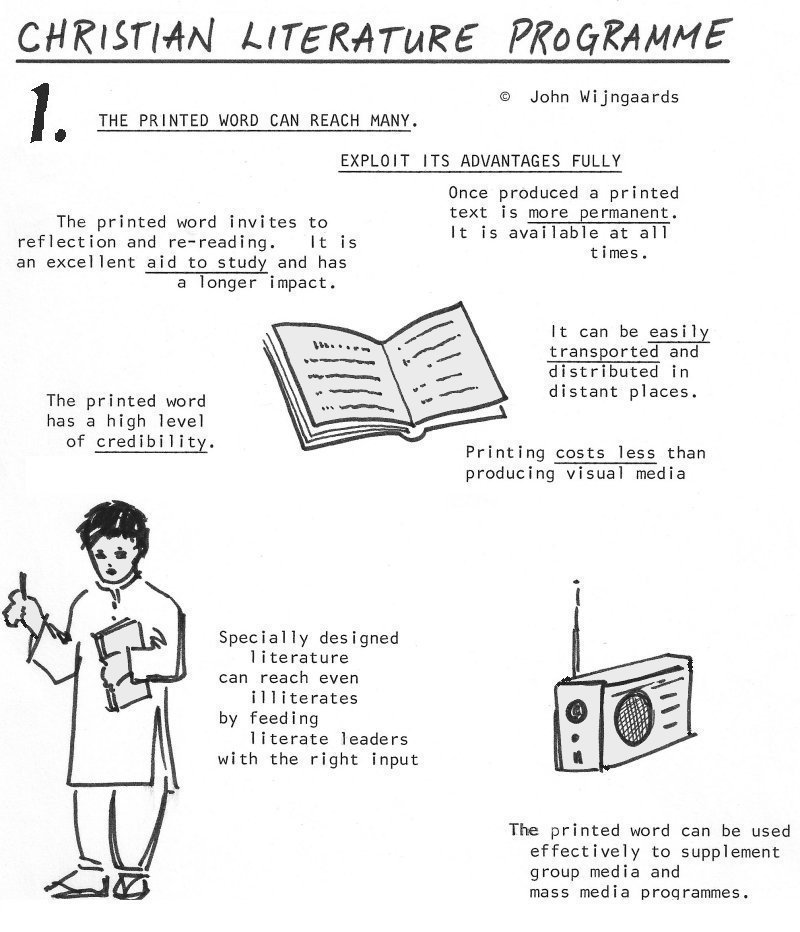
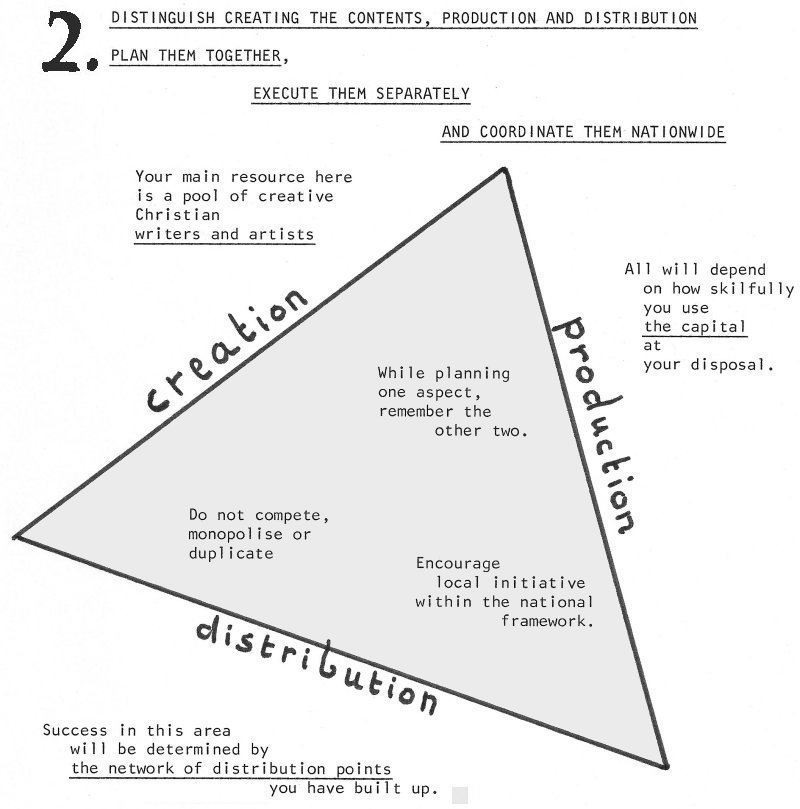
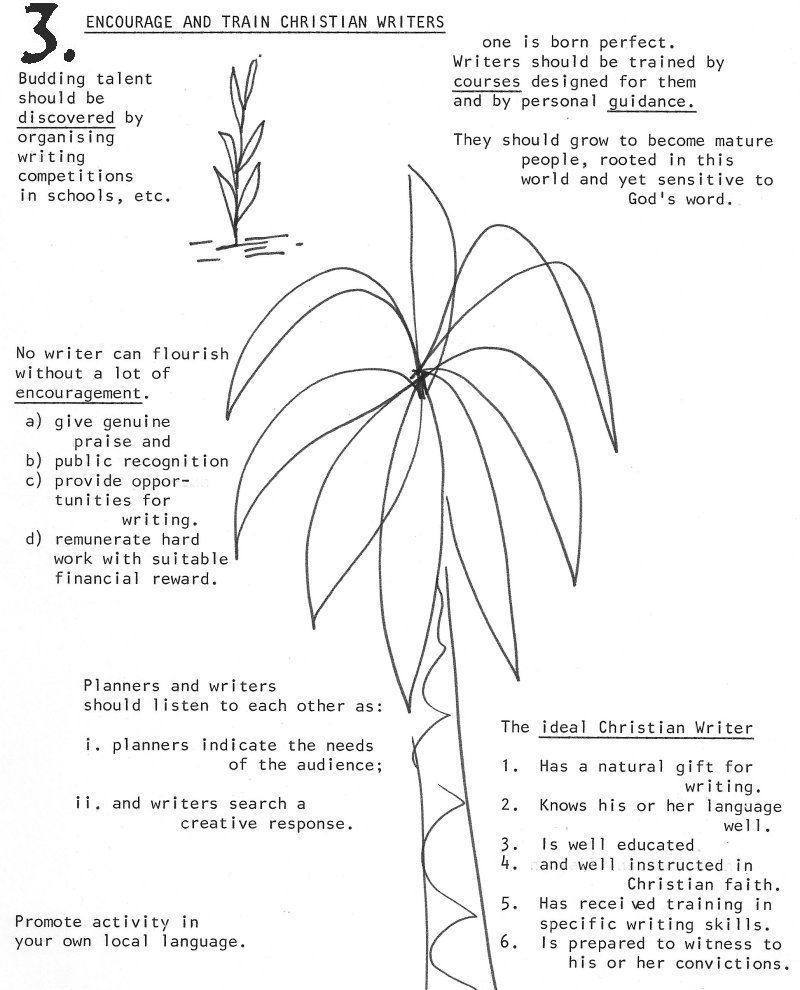
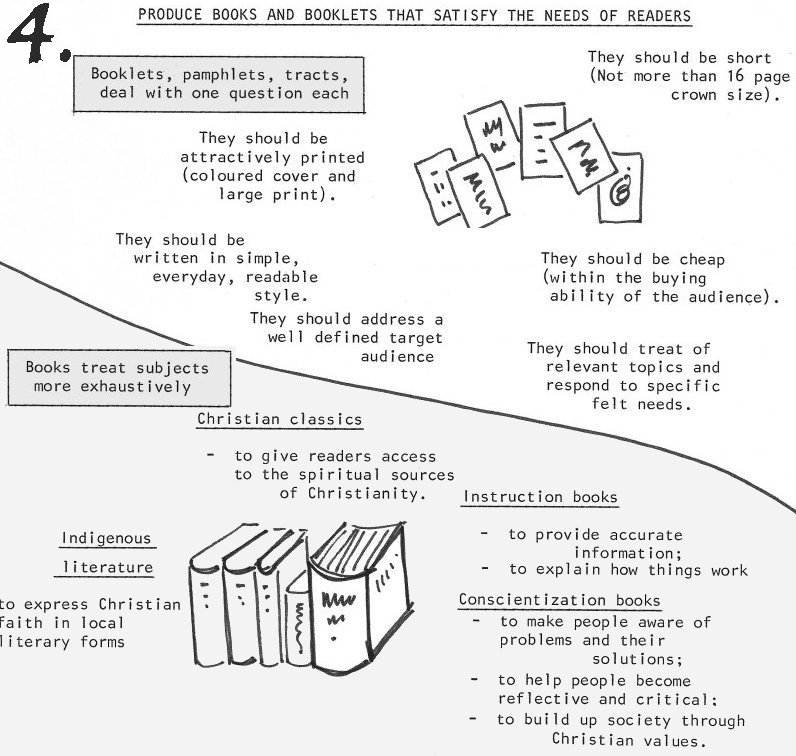
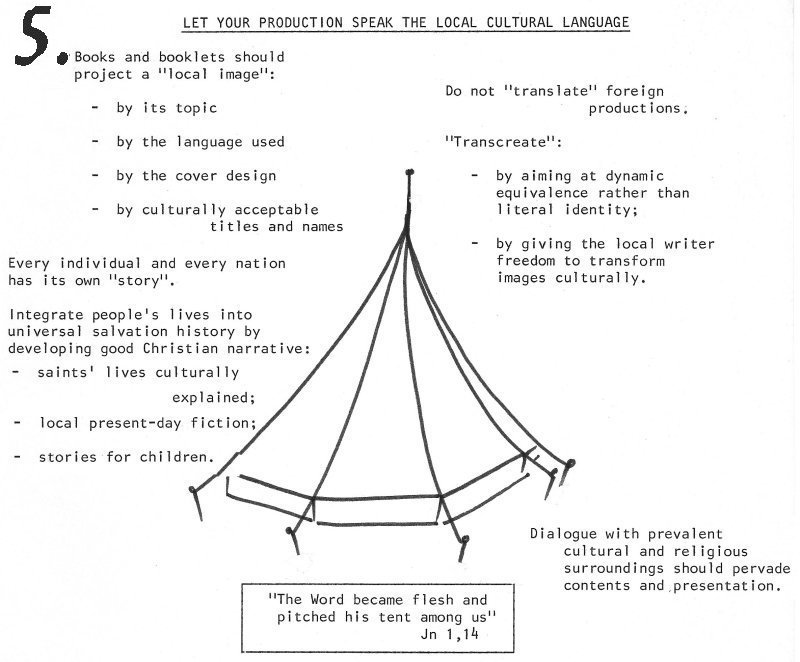
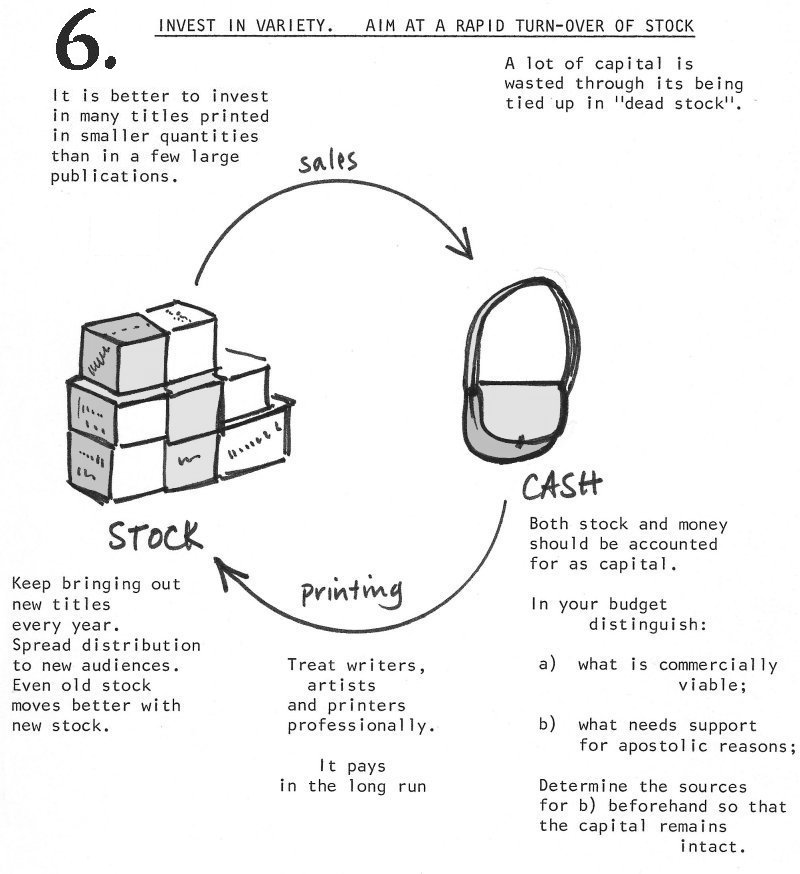
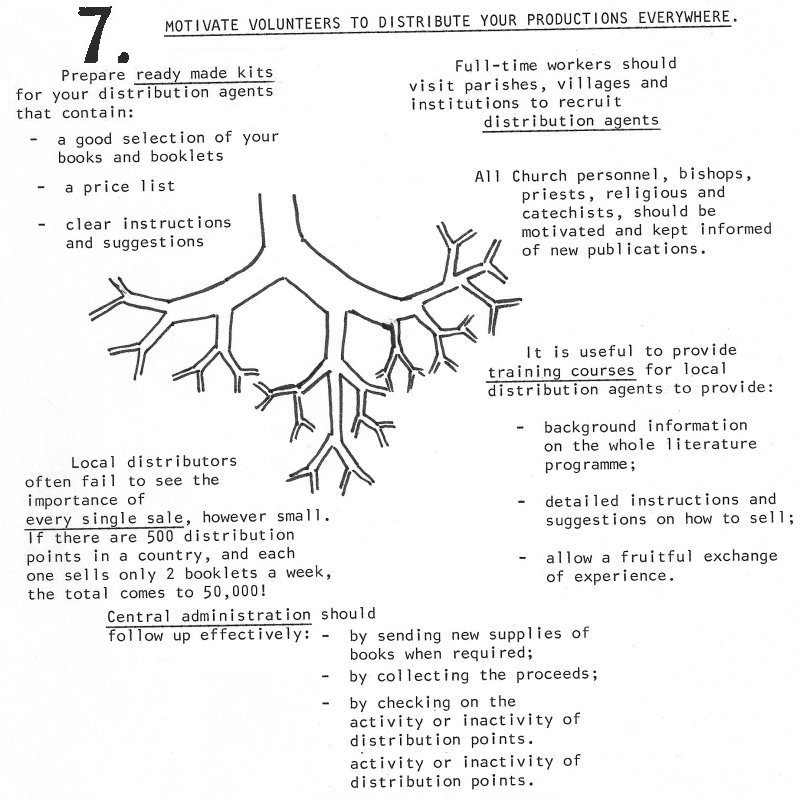
Our course at Multan was marked by two special visits. One was by Bishop Patras Jusaf, the Bishop of Multan. He was known for his Urdu writings, among them a book on the Christian family. In his presentation to the participants the bishop made an impassioned plea for Christian writers to expose the desperate situation of the many sweeper-caste Christians. They were exploited by everyone, he said. They had no one to defend their cause.
Bishop John Joseph of neighbouring Faisalabad also visited us. He addressed the participants on the need of national cooperation and sharing of helpful material. Some years later, in 1998, the bishop committed suicide to protest against the cruel treatment of Christians. A Christian man had been executed on trumped up blasphemy charges. The bishop shot himself outside the house of an official who had been responsible in the whole affair.
Rabita Manzil
The Catholic Communicatons Center in Lahore, which we helped plan, proved a great success. It adopted the Urdu name ‘Rabita Manzil’. It set up a website. It produced weekly newspapers and a bi-monthly magazine. It housed the office of the Radio Veritas Asian Urdu service.
In 2009 it succeeded to launch a TV channel which became known as ‘Good News Catholic TV’. Unfortunately, the channel was banned by the Pakistani government in 2016.
In 1984 Bishop Armando Trindade of Lahore sent us the following recognition:
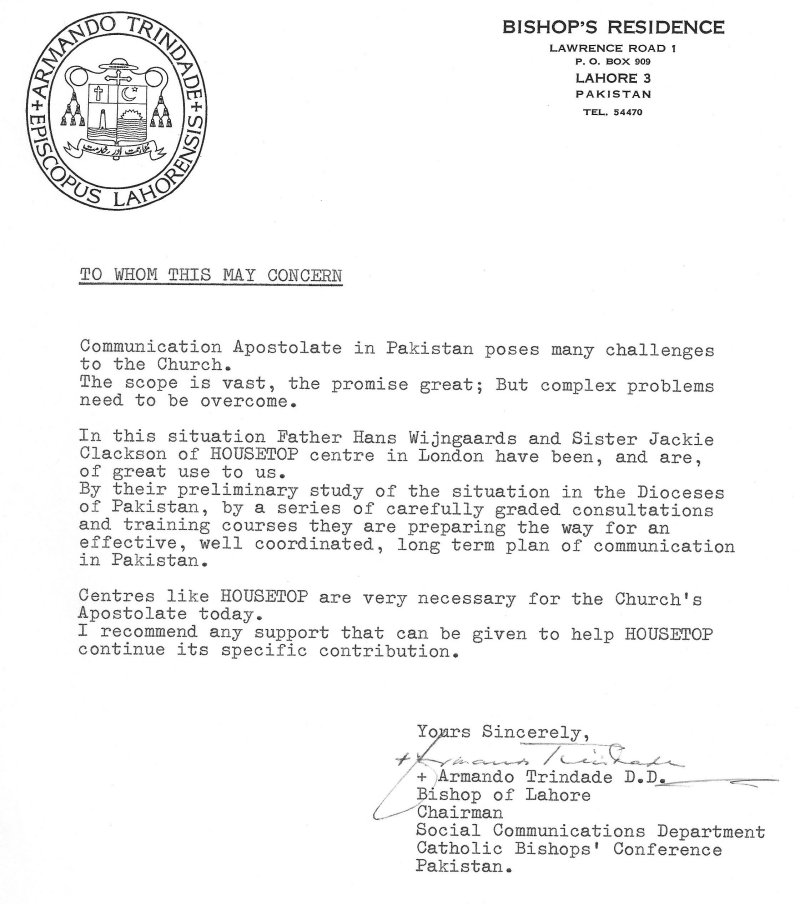
THE STORY OF MY LIFE
- » FOREWORD
- » Part One. LEARNING TO SURVIVE
- » origins
- » into gaping jaws
- » from the pincers of death
- » my father
- » my mother
- » my rules for survival
- » Part Two. SUBMIT TO CLERICAL DOGMA — OR THINK FOR MYSELF?
- » seeking love
- » learning to think
- » what kind of priest?
- » training for battle
- » clash of minds
- » lessons on the way to India
- » Part Three (1). INDIA - building 'church'
- » St John's Seminary Hyderabad
- » Andhra Pradesh
- » Jyotirmai – spreading light
- » Indian Liturgy
- » Sisters' Formation in Jeevan Jyothi
- » Helping the poor
- » Part Three (2). INDIA – creating media
- » Amruthavani
- » Background to the Gospels
- » Storytelling
- » Bible translation
- » Film on Christ: Karunamayudu
- » The illustrated life of Christ
- » Part Three (3). INDIA - redeeming 'body'
- » spotting the octopus
- » the challenge
- » screwed up sex guru
- » finding God in a partner?
- » my code for sex and love
- » Part Four. MILL HILL SOCIETY
- » My job at Mill Hill
- » The future of missionary societies
- » Recruitment and Formation
- » Returned Missionaries
- » Brothers and Associates
- » Part Five. HOUSETOP LONDON
- » Planning my work
- » Teaching teaching
- » Pakistan
- » Biblical Spirituality
- » Searching God in our modern world
- » ARK2 Christian Television
- » Part Five (2) New Religious Movements
- » Sects & Cults
- » Wisdom from the East?
- » Masters of Deception
- » Part Five (3). VIDEO COURSES
- » Faith formation through video
- » Our Spirituality Courses
- » Walking on Water
- » My Galilee My People
- » Together in My Name
- » I Have No Favourites
- » How to Make Sense of God
- » Part Six (1). RESIGNATION
- » Publicity
- » Preamble
- » Reaction in India
- » Mill Hill responses
- » The Vatican
- » Part 6 (2). JACKIE
- » childhood
- » youth and studies
- » finding God
- » Mission in India
- » Housetop apostolate
- » poetry
- » our marriage
